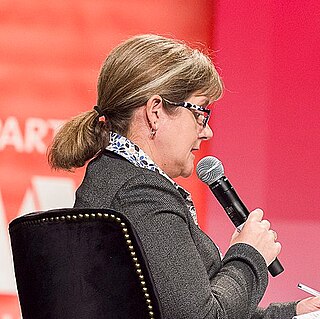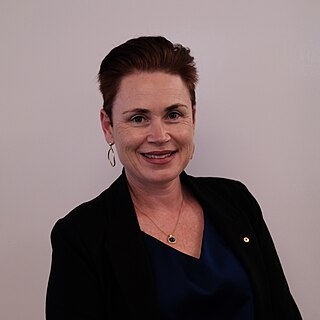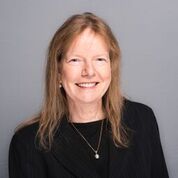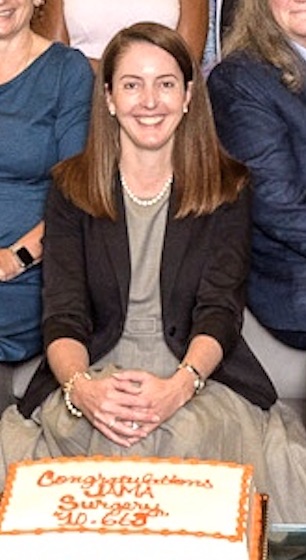
The Eureka Prizes are awarded annually by the Australian Museum, Sydney, to recognise individuals and organizations who have contributed to science and the understanding of science in Australia. They were founded in 1990 following a suggestion by science journalist Robyn Williams.

The Garvan Institute of Medical Research is an Australian biomedical research institute located in Darlinghurst, Sydney, New South Wales. Founded in 1963 by the Sisters of Charity as a research department of St Vincent's Hospital, it is now one of Australia's largest medical research institutions, with approximately 750 scientists, students and support staff.
Christopher Carl Goodnow is an immunology researcher and the current executive director of the Garvan Institute of Medical Research. He holds the Bill and Patricia Ritchie Foundation Chair and is a Conjoint Professor in the faculty of medicine at UNSW Sydney. He holds dual Australian and US citizenship.

Lisa Harvey-Smith is a British-Australian astrophysicist, Australia's Women in STEM Ambassador and a Professor of Practice in Science Communication at the University of NSW. Her research interests include the origin and evolution of cosmic magnetism, supernova remnants, the interstellar medium, massive star formation and astrophysical masers. For almost a decade Harvey-Smith was a research scientist at Australia’s Commonwealth Scientific and Industrial Research Organisation (CSIRO), including several years as the Project Scientist for the Square Kilometre Array Pathfinder and later Project Scientist for the Australian Square Kilometre Array Pathfinder (ASKAP) Telescope.
Gail Garvey is an Indigenous Australian Health Services Researcher with a core focus on Psycho-oncology and Indigenous people. Garvey is a Kamilaroi woman whose family originated from Moree in western New South Wales. She was a professor at the Menzies School of Health, and served as a Senior Principal Research Fellow and Deputy Division Leader for the Wellbeing and Preventable Chronic Diseases Division. She was recently appointed as a Professor at the University of Queensland, Brisbane

Leslie "Les" Lazarus was an Australian endocrinologist who was one of the first co-Directors of the Garvan Institute of Medical Research, Sydney from 1966 to 1969 and sole Director from 1969 to 1990. At the Garvan Institute he led a joint laboratory and clinical research team studying diabetes and pituitary hormone secretions, in particular the secretion and clinical uses of human growth hormone.
Athena SWAN is an equality charter mark framework and accreditation scheme established and managed by the UK Equality Challenge Unit in 2005 that recognises and celebrates good practices in higher education and research institutions towards the advancement of gender equality: representation, progression and success.

Diana Temple AM (1925–2006) was an Australian pharmacologist and Associate Professor who pioneered respiratory research in Australia. She was recognised for her work on respiratory pharmacology, the role of women in science and in promoting popular science.

Melissa Helen Little is an Australian scientist and academic, currently Theme Director of Cell Biology, heading up the Kidney Regeneration laboratory at the Murdoch Children's Research Institute. She is also a Professor in the Faculty of Medicine, Dentistry and Health Sciences, University of Melbourne, and Program Leader of Stem Cells Australia. In January 2022, she became CEO of the Novo Nordisk Foundation Center for Stem Cell Medicine reNEW, an international stem cell research center based at University of Copenhagen, and a collaboration between the University of Copenhagen, Denmark, Murdoch Children’s Research Institute, Australia, and Leiden University Medical Center, The Netherlands.
Maree Rose Teesson, FAAHMS, FASSA, is an Australian expert on mental health. She is the Director of The Matilda Centre for Research in Mental Health and Substance Use and NHMRC Principal Research Fellow at the University of Sydney. She is also professorial fellow at the Black Dog Institute, UNSW.
Madhu Bhaskaran is an engineer and Professor at RMIT University. She co-leads the Functional Materials and Microsystems Research Group at RMIT University She won the APEC Aspire prize in 2018 for her development of "electronic skin".
Maria Kavallaris is an Australian scientist, based at the University of New South Wales' Children's Cancer Institute, where she is best known for her contributions to the field of cancer research. On 25 January 2019, Kavallaris was appointed a member of the Order of Australia.

Marguerite Virginia Evans-Galea is the co-founder of Women in STEMM Australia. STEMM. Her research is focused on gene therapy and neurodegenerative diseases.

Renae Monique Ryan is the academic director of the Science in Australia Gender Equity (SAGE) Program at the University of Sydney, and a researcher in neuroscience, pharmacology, and membrane transport proteins. She argues for systemic change to increase academic diversity.
Professor Alison Todd is holder of 18 patents, and a co-founder and chief scientific officer of SpeeDx. The company manufactures and sells tests for detecting infectious pathogens and identifying antibiotic resistance. The biomedical company, co-founded by Todd, develops diagnostic tools. Todd mentors younger scientists and entrepreneurs, as well as advocating for greater gender diversity in leaders in STEM. ‘Nearly 60 per cent of medical science and health graduates are women, but we hold only 20 per cent of senior leadership positions in the field’.

Sue Barrell was chief scientist at the Bureau of Meteorology (BoM). In 2013 she was awarded a Fellow of the Academy of Technology and Engineering (FTSE). In 2018, Barrell was elected Vice President of Science and Technology Australia. Amongst other topics, she has worked on international science policy climate monitoring, research and policy, and ocean–earth observations. Barrell was the first female meteorologist to join the senior Executive team of the BoM. She was the first female elected to leadership of a WMO Technical Commission and was one of the early female forecasters.

Leonie Walsh is a fellow of the Australian Academy of Technological Sciences, and was the first Lead Scientist in Victoria, from 2013 to 2016, as well as the inaugural Women in STEMM Ambassador and the first women president of Australasian Industrial Research Group She was the representative for Victoria on the Forum of Australian Chief Scientists. Walsh received an honorary Doctorate (HonDUniv) due to her contributions in leadership to scientific enterprises, innovation and community leadership, from Swinburne University of Technology. Walsh was a judge in the Westpac 100 Women of Influence awards in 2016.

Melina R. Kibbe is an American clinician and researcher in the field of vascular surgery. She currently serves as Dean of the University of Virginia School of Medicine. She previously held the Colin G. Thomas Jr. Distinguished Professorship and Chair of the Department of Surgery at UNC School of Medicine.
Fabienne Mackay is a French Australian research immunologist and institutional leader within the Australian medical research, education and innovation sectors. She is the Director and CEO of the QIMR Berghofer Medical Research Institute since 2020, after being the inaugural Head of the School of Biomedical Sciences at the University of Melbourne during the preceding five years. She is also an Honorary Professor at the Faculties of Medicine of the University of Queensland and the University of Melbourne. Her work has attracted public attention for its contribution to the pathophysiological understanding and treatment of lupus and other autoimmune diseases. Mackay has been notably awarded, achieving international reputation for her widely cited research describing B-cell activating factor (BAFF) and other cytokines of the TNF receptor superfamily, and their roles in B cell physiology, autoimmunity and cancer. She is an elected Fellow of the Australian Academy of Health and Medical Sciences.
Professor Asha Bowen is an Australian Paediatric Infectious Diseases clinician-scientist and a leading voice and advocate for children's health and well-being. She is Head of the Department of Infectious Diseases at Perth Children's Hospital, and Head of the Healthy Skin and ARF Prevention team at Telethon Kids Institute. She was the former Program Head of the End Rheumatic Heart Disease program (2022-2023) at the Telethon Kids Institute. Bowen leads a large body of skin health research in partnership with healthcare workers and community in the Kimberley while expanding her team and work to understand skin health in urban Aboriginal children better. She has been widely acknowledged and awarded for her contributions towards improving the health and well-being of Australian children, and addressing existing health inequities faced by First Nations Australian children and their families. Throughout the COVID-19 pandemic she contributed her knowledge and expertise to clinical research, guideline development and on several national and public health committees. She has published widely in the area of paediatric infectious diseases and is a recognized expert in the field who regularly contributes to popular Australian media sources such as The Conversation.











